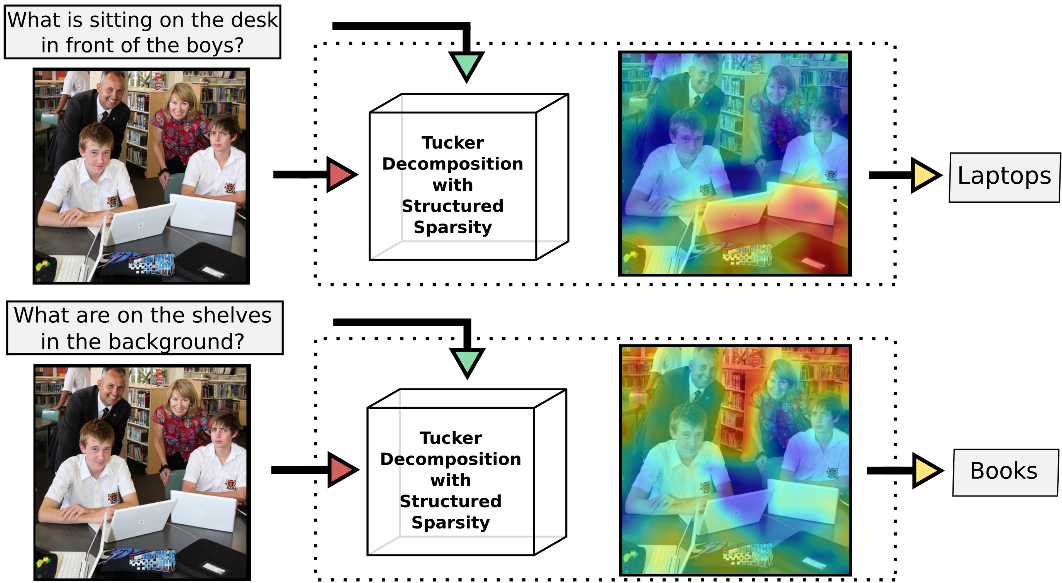MADE (Multi-Adapter Dataset Experts)
This repository contains the implementation of MADE (Multi-adapter dataset experts), which is described in the paper Single-dataset Experts for Multi-dataset Question Answering.
MADE combines a shared Transformer with a collection of adapters that are specialized to different reading comprehension datasets. See our paper for details.
Quick links
Requirements
The code uses Python 3.8, PyTorch, and the adapter-transformers library. Install the requirements with:
pip install -r requirements.txt
Download the data
You can download the datasets used in the paper from the repository for the MRQA 2019 shared task.
The datasets should be stored in directories ending with train or dev. For example, download the in-domain training datasets to a directory called data/train/ and download the in-domain development datasets to data/dev/.
For zero-shot and few-shot experiments, download the MRQA out-of-domain development datasets to a separate directory and split them into training and development splits using scripts/split_datasets.py. For example, download the datasets to data/transfer/ and run
ls data/transfer/* -1 | xargs -l python scripts/split_datasets.py
Use the default random seed (13) to replicate the splits used in the paper.
Download the trained models
The trained models are stored on the HuggingFace model hub at this URL: https://huggingface.co/princeton-nlp/MADE. All of the models are based on the RoBERTa-base model. They are:
- MADE Transformer
- MADE adapters (with and without separately tuning the adapters on each dataset).
- SQuAD (with adapter tuning | without adapter tuning)
- HotpotQA (with adapter tuning | without adapter tuning)
- TriviaQA (with adapter tuning | without adapter tuning)
- NewsQA (with adapter tuning | without adapter tuning)
- SearchQA (with adapter tuning | without adapter tuning)
- NaturalQuestions (with adapter tuning | without adapter tuning)
- Multi-dataset fine-tuning
- Single-dataset fine-tuning
- Single-dataset adapters
To download just the MADE Transformer and adapters:
mkdir made_transformer
wget https://huggingface.co/princeton-nlp/MADE/resolve/main/made_transformer/model.pt -O made_transformer/model.pt
mkdir made_tuned_adapters
for d in SQuAD HotpotQA TriviaQA SearchQA NewsQA NaturalQuestions; do
mkdir "made_tuned_adapters/${d}"
wget "https://huggingface.co/princeton-nlp/MADE/resolve/main/made_tuned_adapters/${d}/model.pt" -O "made_tuned_adapters/${d}/model.pt"
done;
You can download all of the models at once by cloning the repository (first installing Git LFS):
git lfs install
git clone https://huggingface.co/princeton-nlp/MADE
mv MADE models
Run the model
The scripts in scripts/train/ and scripts/transfer/ provide examples of how to run the code. For more details, see the descriptions of the command line flags in run.py.
Train
You can use the scripts in scripts/train/ to train models on the MRQA datasets. For example, to train MADE:
./scripts/train/made_training.sh
And to tune the MADE adapters separately on individual datasets:
for d in SQuAD HotpotQA TriviaQA SearchQA NewsQA NaturalQuestions; do
./scripts/train/made_adapter_tuning.sh $d
done;
See run.py for details about the command line arguments.
Evaluate
A single fine-tuned model:
python run.py \
--eval_on BioASQ DROP DuoRC RACE RelationExtraction TextbookQA \
--load_from multi_dataset_ft \
--output_dir output/zero_shot/multi_dataset_ft
An individual MADE adapter (e.g. SQuAD):
python run.py \
--eval_on BioASQ DROP DuoRC RACE RelationExtraction TextbookQA \
--load_from made_transformer \
--load_adapters_from made_tuned_adapters \
--adapter \
--adapter_name SQuAD \
--output_dir output/zero_shot/made_tuned_adapters/SQuAD
An individual single-dataset adapter (e.g. SQuAD):
python run.py \
--eval_on BioASQ DROP DuoRC RACE RelationExtraction TextbookQA \
--load_adapters_from single_dataset_adapters/ \
--adapter \
--adapter_name SQuAD \
--output_dir output/zero_shot/single_dataset_adapters/SQuAD
An ensemble of MADE adapters. This will run a forward pass through every adapter in parallel.
python run.py \
--eval_on BioASQ DROP DuoRC RACE RelationExtraction TextbookQA \
--load_from made_transformer \
--load_adapters_from made_tuned_adapters \
--adapter_names SQuAD HotpotQA TriviaQA SearchQA NewsQA NaturalQuestions \
--made \
--parallel_adapters \
--output_dir output/zero_shot/made_ensemble
Averaging the parameters of the MADE adapters:
python run.py \
--eval_on BioASQ DROP DuoRC RACE RelationExtraction TextbookQA \
--load_from made_transformer \
--load_adapters_from made_tuned_adapters \
--adapter_names SQuAD HotpotQA TriviaQA SearchQA NewsQA NaturalQuestions \
--adapter \
--average_adapters \
--output_dir output/zero_shot/made_avg
Running UnifiedQA:
python run.py \
--eval_on BioASQ DROP DuoRC RACE RelationExtraction TextbookQA \
--seq2seq \
--model_name_or_path allenai/unifiedqa-t5-base \
--output_dir output/zero_shot/unifiedqa
Transfer
The scripts in scripts/transfer/ provide examples of how to run the few-shot transfer learning experiments described in the paper. For example, the following command will repeat for three random seeds: (1) sample 64 training examples from BioASQ, (2) calculate the zero-shot loss of all the MADE adapters on the training examples, (3) average the adapter parameters in proportion to zero-shot loss, (4) hold out 32 training examples for validation data, (5) train the adapter until performance stops improving on the 32 validation examples, and (6) evaluate the adapter on the full development set.
python run.py \
--train_on BioASQ \
--adapter_names SQuAD HotpotQA TriviaQA NewsQA SearchQA NaturalQuestions \
--made \
--parallel_made \
--weighted_average_before_training \
--adapter_learning_rate 1e-5 \
--steps 200 \
--patience 10 \
--eval_before_training \
--full_eval_after_training \
--max_train_examples 64 \
--few_shot \
--criterion "loss" \
--negative_examples \
--save \
--seeds 7 19 29 \
--load_from "made_transformer" \
--load_adapters_from "made_tuned_adapters" \
--name "transfer/made_preaverage/BioASQ/64"
Bugs or questions?
If you have any questions related to the code or the paper, feel free to email Dan Friedman ([email protected]). If you encounter any problems when using the code, or want to report a bug, you can open an issue. Please try to specify the problem with details so we can help you better and quicker!
Citation
@inproceedings{friedman2021single,
title={Single-dataset Experts for Multi-dataset QA},
author={Friedman, Dan and Dodge, Ben and Chen, Danqi},
booktitle={Empirical Methods in Natural Language Processing (EMNLP)},
year={2021}
}




